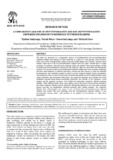Please use this identifier to cite or link to this item:
https://cris.library.msu.ac.zw//handle/11408/1632Full metadata record
| DC Field | Value | Language |
|---|---|---|
| dc.contributor.author | Gudyanga, Ephias | - |
| dc.contributor.author | Moyo, Sarah | - |
| dc.contributor.author | Gudyanga, Anna | - |
| dc.contributor.author | Susa, Richard | - |
| dc.date.accessioned | 2016-06-24T12:34:58Z | - |
| dc.date.available | 2016-06-24T12:34:58Z | - |
| dc.date.issued | 2015-06 | - |
| dc.identifier.issn | 0975-833X | - |
| dc.identifier.uri | http://hdl.handle.net/11408/1632 | - |
| dc.description.abstract | The study was premised on a comparative analysis of institutionalised and non-institutionalised orphaned children with reference to their wellbeing .A sample of 5 rural primary school teachers, where most of the institutionalised orphans learn and another purposively selected 5 primary school teachers where most of the non-institutionalised orphans learn, was made. Another part of sample comprised 10 orphans, 5 from the local orphanage centre and another 5 from non-institution. All the 20 participants were individually interviewed and audiotape. Data was transcribed and thematically anaysed. It was found out that non-institutionalised orphaned children had worse academic challenges and were often burdened by problems and chores at home and their keenness to learn was hindered by absenteeism and sometimes coming to school on empty stomachs thereby losing concentration. They lacked resources to meet the basic needs, education and health care all of which resulted in poor school attendance and educational achievement was negatively impacted upon. Orphans from both institutions reported being abused emotionally, physically, and sexually by the caregivers, school teachers and the guardians (relatives). Poor health and malnutrition negatively affected orphaned children. Other children looked down upon orphans and in the process disassociating themselves from them (orphaned children) and this negatively affected their intention to be in the same academic groups when they are marginalized, sidelined especially when sharing materials. This negatively affected their self-perception and image. It was concluded that non-institutionalised orphaned children were marred with more challenges than the institutionalised orphaned children. It was recommended (among others) stiff penalties to be applied by Government on child abuse perpetrators. | en_US |
| dc.language.iso | en | en_US |
| dc.publisher | International Journal of Current Research | en_US |
| dc.relation.ispartofseries | International Journal of Current Research;Vol. 7, No. 06; p. 17546-17554, | - |
| dc.subject | Institutionalised, non-institutionalised orphaned children | en_US |
| dc.title | A comparative analysis of institutionalised and non orphaned children with reference to their wellbeing | en_US |
| dc.type | Article | en_US |
| item.openairecristype | http://purl.org/coar/resource_type/c_18cf | - |
| item.grantfulltext | open | - |
| item.languageiso639-1 | en | - |
| item.fulltext | With Fulltext | - |
| item.openairetype | Article | - |
| item.cerifentitytype | Publications | - |
| Appears in Collections: | Research Papers | |
Files in This Item:
| File | Description | Size | Format | |
|---|---|---|---|---|
| A COMPARATIVE ANALYSIS OF INSTITUTIONALISED AND NON INSTITUTIONALISED OPHARNED CHN.pdf | Full Text | 311.89 kB | Adobe PDF |  View/Open |
Page view(s)
24
checked on Jul 25, 2024
Download(s)
12
checked on Jul 25, 2024
Google ScholarTM
Check
Items in MSUIR are protected by copyright, with all rights reserved, unless otherwise indicated.



